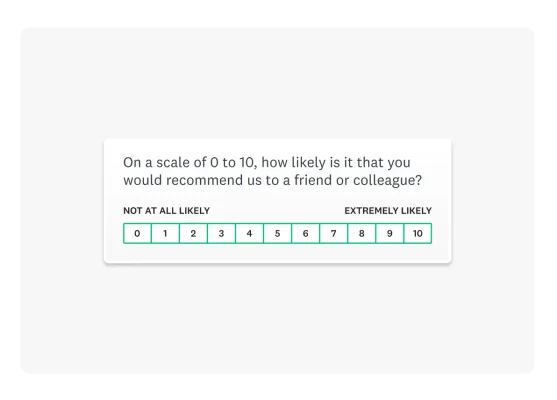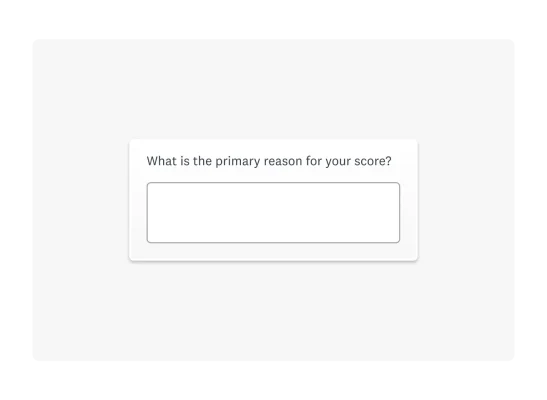Survey vs. questionnaire: Key differences and use cases
What’s the difference between a survey and questionnaire, and does it matter? Yes, it does. Learn best practices and tips for creating both.

Is a survey the same as a questionnaire?
Don’t worry if you’re unsure, because you’re not alone. Even professional researchers often use the two terms interchangeably.
But there’s an important distinction. A questionnaire is simply a set of written questions, while a survey refers to the entire process, from designing and distributing the questionnaire to collecting and analysing responses.
Over 3.5 million surveys are deployed each year via SurveyMonkey. We know that great survey design starts with the basics, and that begins with understanding the difference between a survey and a questionnaire.
Surveys versus questionnaires
A questionnaire is any written set of questions, while a survey is both the set of questions and the process of collecting, aggregating and analysing the responses from those questions.
| Survey | Questionnaire | |
| Individual questions | ✔ | ✔ |
| Delivery of questionnaire | ✔ | ✖ |
| Analysis of responses | ✔ | ✖ |
Let’s review a survey vs. questionnaire more closely and explore how you can excel in executing each of them.
How to write a great questionnaire
Any set of questions, regardless of how personal or general the subject matter is, is a questionnaire. Whether your questionnaire stands on its own or is part of a survey, to get great results you need to ask great questions. Check our guide to writing survey questions like a pro for more about selecting great questions for your questionnaire.
Also, as you write a questionnaire, bear its length in mind. As the number of questions increases, the completion rate often decreases. In one study, we found that questionnaires with 40 questions have about a 10% lower response rate than questionnaires with 10 questions. People also tend to spend about 10 minutes filling out a questionnaire, regardless of its length. This means that if you ask fewer questions, it’s likely that your respondents will spend more time on each question.
Get insights from your target market
Send your survey to a large or small group of people with our online Audience panel.
Our two-question NPS survey may be an extreme example (given how short it is), but it’s effective in motivating respondents to answer each question thoughtfully:


3 steps for running a successful survey
The way in which you design, implement and analyse a survey will impact your results as much as the questions you ask. Let’s dive into each of these areas:
- Survey design marks a key difference between a survey and a questionnaire. It involves planning each part of your survey project, from defining your survey goals to aligning on who reviews your survey responses. Learn more about survey design by checking out our best practices.
- The way in which you collect responses also has an impact on your survey. You can use a number of approaches to collecting feedback, including sharing a link to your survey on social media, emailing the survey to your audience and embedding it on your site. And if you need help with surveying your target market, SurveyMonkey Audience can help.
- As the responses come in, you can take a closer look at them via SurveyMonkey Analyze. The tool offers a virtually endless number of ways to segment, aggregate and analyse your survey responses so that you can gain a better understanding of your feedback and make great decisions.
When to use a survey instead of a questionnaire, and vice versa
There is a limited number of use cases for standalone questionnaires. These use cases include building an email list, accepting payments or donations, or collecting personal accounts for a research project. Wufoo is often ideal for these applications, especially when payments are involved.
If, on the other hand, you’re looking for feedback from your respondents, then a survey would be a better option. It aggregates data from multiple respondents so that you can draw broad conclusions about your results.
Now that you can answer the longstanding question “Is a survey the same as a questionnaire?”, you can start to collect actionable feedback today! Start your survey.
NPS, Net Promoter and Net Promoter Score are registered trademarks of Satmetrix Systems, Inc., Bain & Company and Fred Reichheld.
Discover more resources

Solutions for your role
SurveyMonkey can help you do your job better. Discover how to make a bigger impact with winning strategies, products, experiences and more.

How to Analyse Survey Data in Excel
Learn how to analyse survey data in Excel and gain insights with our easy-to-follow guide.

Continuing healthcare checklist: what UK healthcare providers need
Learn what information healthcare and social workers need to provide for a continuing healthcare checklist, what happens next and possible outcomes.

Turning employee engagement statistics into actionable surveys
Discover how to use UK employee engagement statistics to design effective surveys. Use actionable insights to boost retention and drive productivity.